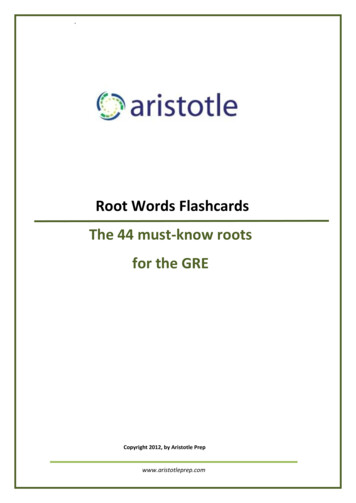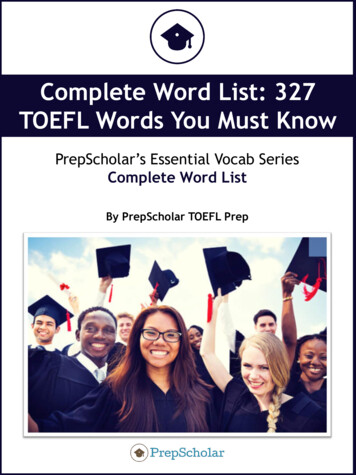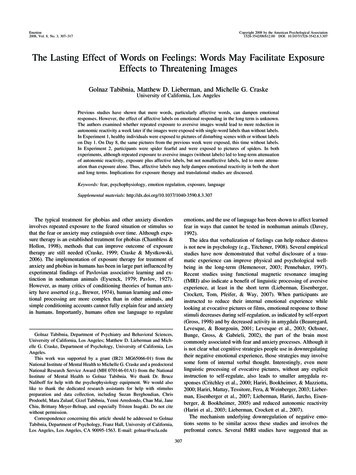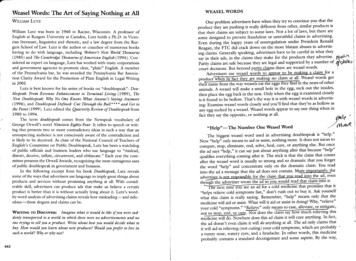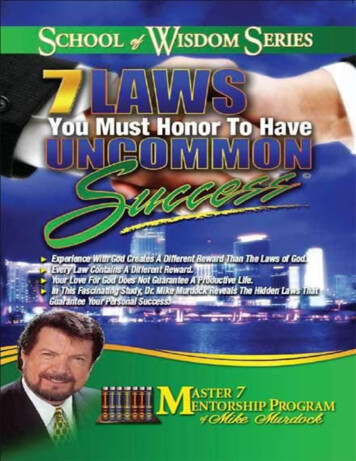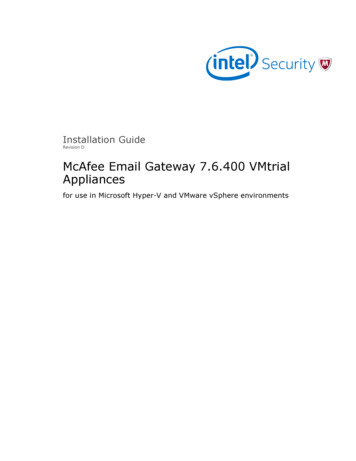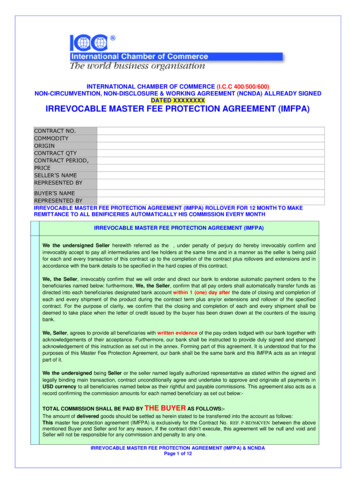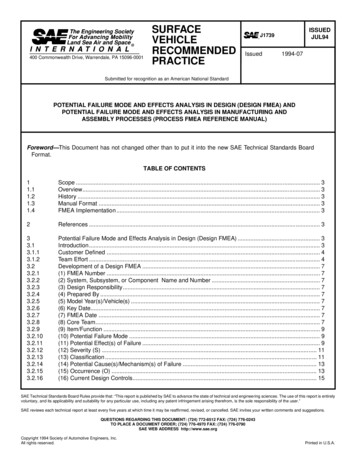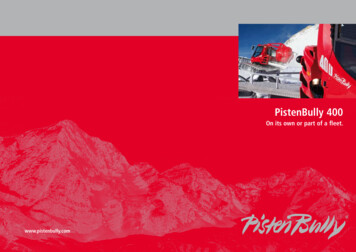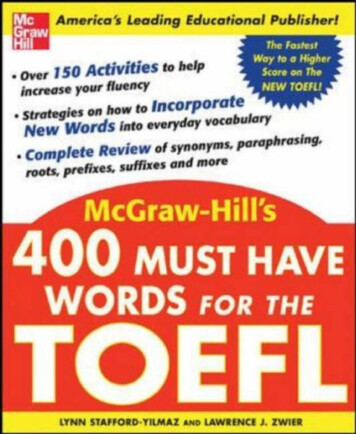
Transcription
400 Must-Have Wordsfor the TOEFL
This page intentionally left blank.
400 Must-Have Wordsfor the TOEFL LYNN STAFFORD-YILMAZLAWRENCE J. ZWIERMCGRAW-HILLNew York Chicago San Francisco LisbonLondon Madrid Mexico City Milan New DelhiSan Juan Seoul Singapore Sydney Toronto
Copyright 2005 by The McGraw-Hill Companies, Inc. All rights reserved. Manufactured in theUnited States of America. Except as permitted under the United States Copyright Act of 1976, no partof this publication may be reproduced or distributed in any form or by any means, or stored in adatabase or retrieval system, without the prior written permission of the publisher.0-07-146707-6The material in this eBook also appears in the print version of this title: 0-07-144328-2.All trademarks are trademarks of their respective owners. Rather than put a trademark symbol afterevery occurrence of a trademarked name, we use names in an editorial fashion only, and to the benefitof the trademark owner, with no intention of infringement of the trademark. Where such designationsappear in this book, they have been printed with initial caps. McGraw-Hill eBooks are available atspecial quantity discounts to use as premiums and sales promotions, or for use in corporate trainingprograms. For more information, please contact George Hoare, Special Sales, atgeorge hoare@mcgraw-hill.com or (212) 904-4069.TERMS OF USEThis is a copyrighted work and The McGraw-Hill Companies, Inc. (“McGraw-Hill”) and its licensorsreserve all rights in and to the work. Use of this work is subject to these terms. Except as permittedunder the Copyright Act of 1976 and the right to store and retrieve one copy of the work, you may notdecompile, disassemble, reverse engineer, reproduce, modify, create derivative works based upon,transmit, distribute, disseminate, sell, publish or sublicense the work or any part of it withoutMcGraw-Hill’s prior consent. You may use the work for your own noncommercial and personal use;any other use of the work is strictly prohibited. Your right to use the work may be terminated if youfail to comply with these terms.THE WORK IS PROVIDED “AS IS.” McGRAW-HILL AND ITS LICENSORS MAKE NOGUARANTEES OR WARRANTIES AS TO THE ACCURACY, ADEQUACY ORCOMPLETENESS OF OR RESULTS TO BE OBTAINED FROM USING THE WORK,INCLUDING ANY INFORMATION THAT CAN BE ACCESSED THROUGH THE WORK VIAHYPERLINK OR OTHERWISE, AND EXPRESSLY DISCLAIM ANY WARRANTY, EXPRESSOR IMPLIED, INCLUDING BUT NOT LIMITED TO IMPLIED WARRANTIES OFMERCHANTABILITY OR FITNESS FOR A PARTICULAR PURPOSE. McGraw-Hill and itslicensors do not warrant or guarantee that the functions contained in the work will meet yourrequirements or that its operation will be uninterrupted or error free. Neither McGraw-Hill nor itslicensors shall be liable to you or anyone else for any inaccuracy, error or omission, regardless ofcause, in the work or for any damages resulting therefrom. McGraw-Hill has no responsibility for thecontent of any information accessed through the work. Under no circumstances shall McGraw-Hilland/or its licensors be liable for any indirect, incidental, special, punitive, consequential or similardamages that result from the use of or inability to use the work, even if any of them has been advisedof the possibility of such damages. This limitation of liability shall apply to any claim or causewhatsoever whether such claim or cause arises in contract, tort or otherwise.DOI: 10.1036/0071467076
This book is dedicated to my late father, Richard J. Zwier,an intelligent, unselfish man.And to my dear friend Sepideh Farsai, who developeda keen command of both the vocabulary and idiomsof English.
This page intentionally left blank.
For more information about this title, click hereContentsIntroduction . . . . . . . . . . . . . . . . . . . . . . . . . . . . . . . . . . . . . . . . . . . . . . . . . . .xiSix Quick Hints for Success on the TOEFL . . . . . . . . . . . . . . . . . .xiiiNatureLESSON1Food Crops . . . . . . . . . . . . . . . . . . . . . . . . . . . . . . . . . . . . . . . .3LESSON2Disaster . . . . . . . . . . . . . . . . . . . . . . . . . . . . . . . . . . . . . . .7LESSON3Evolution and Migration . . . . . . . . . . . . . . . . . . . . . .12LESSON4Petroleum Alternatives . . . . . . . . . . . . . . . . . . . . . . . .17LESSON5Time Efficiency . . . . . . . . . . . . . . . . . . . . . . . . . . . . . . .23LESSON6Ancient Life . . . . . . . . . . . . . . . . . . . . . . . . . . . . . . . . . .27LESSON7Computers . . . . . . . . . . . . . . . . . . . . . . . . . . . . . . . . . . .32LESSON8Energy . . . . . . . . . . . . . . . . . . . . . . . . . . . . . . . . . . . . . . .37ScienceMind and BodyLESSON9Memory . . . . . . . . . . . . . . . . . . . . . . . . . . . . . . . . . . . . . .43LESSON10Spirituality . . . . . . . . . . . . . . . . . . . . . . . . . . . . . . . . . . .47LESSON11Illness . . . . . . . . . . . . . . . . . . . . . . . . . . . . . . . . . . . . . . .52LESSON12Surgery . . . . . . . . . . . . . . . . . . . . . . . . . . . . . . . . . . . . . .56LESSON13Ghosts . . . . . . . . . . . . . . . . . . . . . . . . . . . . . . . . . . . . . . .60
ContentsviiiSocietyLESSON14Anthropology . . . . . . . . . . . . . . . . . . . . . . . . . . . . . . . .67LESSON15Social Inequality . . . . . . . . . . . . . . . . . . . . . . . . . . . . . .72LESSON16Expertise . . . . . . . . . . . . . . . . . . . . . . . . . . . . . . . . . . . .77LESSON17Military Operations . . . . . . . . . . . . . . . . . . . . . . . . . . .81LESSON18War and Conquest . . . . . . . . . . . . . . . . . . . . . . . . . . . .86LESSON19History . . . . . . . . . . . . . . . . . . . . . . . . . . . . . . . . . . . . . .90LESSON20Financial Systems . . . . . . . . . . . . . . . . . . . . . . . . . . . . .97LESSON21Wealth and Social Class . . . . . . . . . . . . . . . . . . . . . .101LESSON22Personal Property . . . . . . . . . . . . . . . . . . . . . . . . . . .106LESSON23Employment . . . . . . . . . . . . . . . . . . . . . . . . . . . . . . . .110LESSON24International Trade . . . . . . . . . . . . . . . . . . . . . . . . . .115MoneyGovernment and JusticeLESSON25Politics . . . . . . . . . . . . . . . . . . . . . . . . . . . . . . . . . . . . .123LESSON26A Reasonable Doubt . . . . . . . . . . . . . . . . . . . . . . . . .128LESSON27The Police . . . . . . . . . . . . . . . . . . . . . . . . . . . . . . . . . .133LESSON28Investigating Crimes . . . . . . . . . . . . . . . . . . . . . . . . .138LESSON29Government Corruption . . . . . . . . . . . . . . . . . . . . . .142LESSON30Crimes at Sea . . . . . . . . . . . . . . . . . . . . . . . . . . . . . . . .146LESSON31The War on Drugs . . . . . . . . . . . . . . . . . . . . . . . . . . .151RelationshipsLESSON32Family Relationships . . . . . . . . . . . . . . . . . . . . . . . . .157LESSON33Friendship . . . . . . . . . . . . . . . . . . . . . . . . . . . . . . . . . .162
ContentsixLESSON34Passion . . . . . . . . . . . . . . . . . . . . . . . . . . . . . . . . . . . . .166LESSON35Negative Emotions . . . . . . . . . . . . . . . . . . . . . . . . . . .170LESSON36Social Rebels . . . . . . . . . . . . . . . . . . . . . . . . . . . . . . . .177LESSON37Painting and Sculpture . . . . . . . . . . . . . . . . . . . . . . .181LESSON38The Written Word . . . . . . . . . . . . . . . . . . . . . . . . . . .186LESSON39Entertainment . . . . . . . . . . . . . . . . . . . . . . . . . . . . . . .191LESSON40Risky Fashions . . . . . . . . . . . . . . . . . . . . . . . . . . . . . .195Culture400 Must-Have Words for the TOEFL . . . . . . . . . . . . . . . . . . . . . . .199
This page intentionally left blank.
Introduction400 Must-Have Words for the TOEFL will help you improve your score onthe TOEFL test. In particular, this book will build your TOEFL vocabularyfor the new Internet-based TOEFL of 2005.This book is designed for ease of use as a self-study guide. Its chapterswere written for easy completion in one sitting—about 25 minutes. 400Must-Have Words is also highly effective in the TOEFL-prep classroom.Each chapter begins with a list of 10 target words. These words aredefined and used in sample sentences. Usage tips are given for many words,as are any commonly used parts of speech related to the target word.Following these definitions, the words are practiced in three exercises.TOEFL Prep I and TOEFL Prep II give straightforward practice in a varietyof easy exercise styles.The last exercise,TOEFL Success, includes a TOEFLstyle reading followed by one or two authentic TOEFL-style questions. MostTOEFL Success readings incorporate all 10 target words, and most alsoinclude an additional bonus structure. Each chapter ends with an answer keyso you can check your work.As an extra feature, this book includes a special front section called “SixQuick Hints for Success on the TOEFL .” These hints give general test-takingadvice for TOEFL success.This book was written by ELT professionals who help prepare studentsfor the TOEFL test. Their selection of words for this book was based onextensive experience with the TOEFL test, information about the corpus(body of words) that is used in creating the actual TOEFL test, and TOEFLmaterials published by ETS, the creators of the TOEFL test.400 Must-Have Words for the TOEFL is the best book on the marketto improve your vocabulary for the TOEFL test.Copyright 2005 by The McGraw-Hill Companies, Inc. Click here for terms of use.
This page intentionally left blank.
Six Quick Hints for Success on the TOEFL 1. Try to understand a reading or lecture as a whole. Unlike earlierversions of the TOEFL, the new version tests whether you can seehow ideas interact in a longer reading.2. Take notes. Especially in the listening section, you will need notesto remember what you have heard. Note-taking will also help youconcentrate.You can practice by taking notes of news stories, documentaries, or lectures.3. Study grammar in context, not by itself. Unlike earlier versionsof the TOEFL, the new version has no grammar section. Yourknowledge of grammar is useful in helping you understand thereadings and lectures, not in answering grammar-specific questions.4. Practice writing essays that express your opinion on a topic.The writing section of the 2005 TOEFL includes questions asking for your opinion on various daily topics. These are timed.Practice writing under a time limit, shaping your thoughts intoa well-rounded essay.5. Build up your academic vocabulary. Your ability to comprehendreading passages rests largely on your academic vocabulary. Buildyour vocabulary by reading, making flash cards, and writing sentences using new words in context. A strong vocabulary will helpyou not only in your reading comprehension, but also in listening,writing, and speaking.6. Commit your attention to the test. Some of the topics covered inthe test may not actually interest you. Still, your focused energywill improve your test score. Agree with yourself not to thinkabout other topics during the test. Force yourself to keep your attention on the tested material.Copyright 2005 by The McGraw-Hill Companies, Inc. Click here for terms of use.
This page intentionally left blank.
400 Must-Have Wordsfor the TOEFL
This page intentionally left blank.
NatureCopyright 2005 by The McGraw-Hill Companies, Inc. Click here for terms of use.
This page intentionally left blank.
LESSON1Food CropsTarget Words1. abandon2. adversely3. aggregate4. cultivation5. synthesisprecipitationDefinitions and Samples1. abandon v. To leave; to give upTo save their lives, the sailors had to abandon the sinking ship.Parts of speech abandonment n2. adversely adv. In a harmful way; negativelyExcessive rainfall early in the spring can adversely affect the planting of crops.Usage tips Adversely is often followed by affect.Parts of speech adversity n, adverse adj3. aggregate adj. Gathered into or amounting to a wholeIt is impossible to judge last year’s performance without knowingthe aggregate sales numbers.Usage tips Aggregate is often followed by a term like sum, total, ornumbers.Parts of speech aggregate v, aggregate nCopyright 2005 by The McGraw-Hill Companies, Inc. Click here for terms of use.
Nature44. cultivation n. Preparing the land to grow crops; improvement foragricultural purposesWith the development of land cultivation, hunters and gathererswere able to settle in one place.Parts of speech cultivate v5. fertilize v. To supply with nourishment for plants by adding helpfulsubstances to the soilThis farm fertilizes tomatoes more than any other crop.Parts of speech fertilizer n, fertilization n6. intensify v. To increase in power; to act with increased strengthJacob’s long absence intensified his certainty that he should marryRose.Parts of speech intensification n, intense adj7. irrigation n. The supplying of water to dry landIn dry areas of the country, you can see ditches all over the farmland for irrigation.Parts of speech irrigate v8. obtain v. To gain possession of; to getAfter a series of difficult interviews, he finally was able to obtainthe job.9. photosynthesis n. The process by which green plants make theirown food by combining water, salts, and carbon dioxide in the presence of light.Oxygen is a by-product of the process of photosynthesis.Parts of speech photosynthesize v10. precipitation n. Water that falls to the Earth’s surfaceIn the Pacific Northwest, the high level of precipitation ensures rich,green plant life.
Food Crops5TOEFL Prep I Complete each sentence by filling in the blank withthe best word from the list. Change the form of the word if necessary.Use each word only tosynthesis1. Through , green plants create organic materials with thehelp of chlorophyll.2. The coastal city gets half of its during the months of January, February, and March.3.
In particular, this book will build your TOEFL vocabulary for the new Internet-based TOEFL of 2005. This book is designed for ease of use as a self-study guide. Its chapters were written for easy completion in one sitting—about 25 minutes.400 Must-Have Words is also highly effective in the TOEFL-prep classroom. Each chapter begins with a list of 10 target words. These words are defined and .

